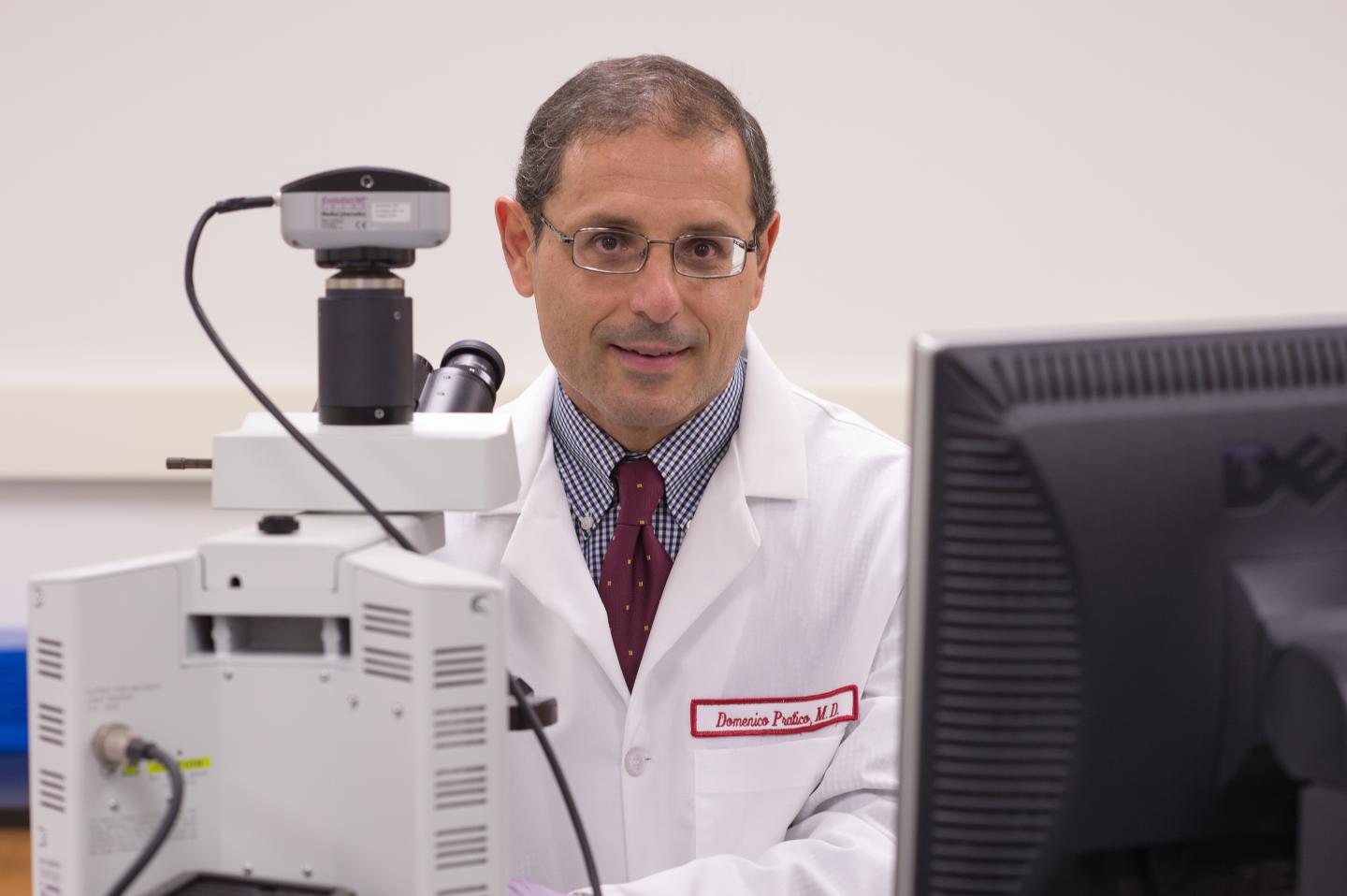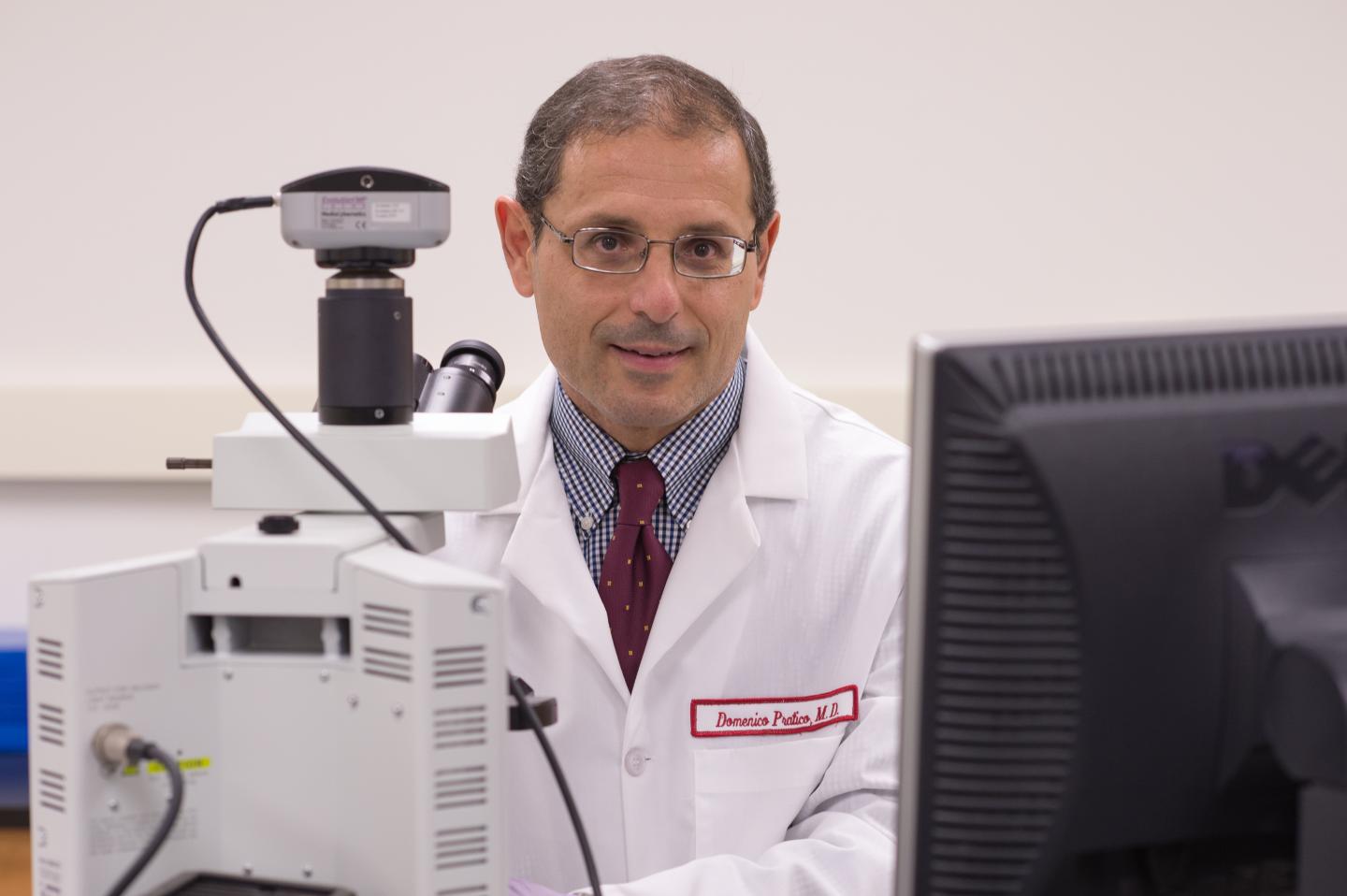
(Philadelphia, PA) – Individuals with Down syndrome who survive into adulthood face the additional challenge of early-onset dementia, in which toxic amyloid plaques build up in the brain. The condition is strikingly similar to Alzheimer's disease, and as new work led by researchers at the Lewis Katz School of Medicine at Temple University (LKSOM) shows, dementia in Down syndrome involves defects in a regulatory enzyme known as γ-secretase activating protein (GSAP), which also happens to malfunction in Alzheimer's disease.
In the field of Down syndrome research, the new findings are groundbreaking, and according to Domenico Praticò, MD, Professor in the Departments of Pharmacology and Microbiology and the Center for Translational Medicine at LKSOM and senior investigator on the study, the work could soon lead to the development of a specific GSAP-targeted therapy that is capable of safely mitigating dementia in Down syndrome. Previous γ-secretase inhibiting drugs failed in patients because of their high intrinsic toxicity.
The study, which appeared online in the Annals of Neurology, is the first to draw a connection between GSAP hyperactivity and excess processing of the Aβ precursor protein (APP) – the protein responsible for the final formation of amyloid beta – in Down syndrome. Dr. Praticò and colleagues made the discovery after examining donated tissue from the brains of deceased Down syndrome patients. Relative to postmortem brain tissue from healthy subjects, the samples from individuals with Down syndrome showed substantially elevated levels of both GSAP protein and its activity.
Dr. Praticò's team also found that GSAP hyperactivity was associated with abnormalities in the GATA1 transcription factor, which controls GSAP production. They demonstrated that when GATA1 activity was silenced in neurons that overexpressed APP, both GSAP levels and amyloid beta peptide levels increased. Overexpression of GATA1, on the other hand, produced the opposite effect.
In Down syndrome, APP overexpression is extreme, reaching levels in the brain that are four to five times higher than normal. Its excess levels are a direct consequence of the triplicate copy of the 21st chromosome, which not only causes the syndrome in the first place but also houses the APP gene.
"The higher levels of APP in Down syndrome patients causes increased formation of amyloid beta peptides which then precipitate in the amyloid plaques in the brain much earlier in life," Dr. Praticò explained. "Amyloid plaques begin to form in the brain of Down syndrome patients in the late teens and early 20s." Symptoms of dementia emerge in the following years.
The new findings could mark a turning point for Down syndrome survivors. "We've shown that GSAP inhibition reduces amyloid production, and because GSAP is specific to the formation of amyloid, without affecting other pathways, it should be a safe alternative to other strategies of a direct γ-secretase inhibition," Dr. Praticò said.
Dr. Praticò and colleagues already have access to a GSAP inhibitor. They plan next to investigate the effects of the agent in preclinical studies in mice. "We are very optimistic that our animal models will work," he said. "If they do, we will move to a clinical trial, where we hope to be able to reduce amyloid production safely and effectively."
###
Other researchers contributing to the new work include Dr. Jin Chu in the Department of Pharmacology and Center for Translational Medicine at LKSOM; and Dr. Thomas Wisniewski in the Departments of Neurology, Psychiatry and Pathology, and Center for Cognitive Neurology at the New York University School of Medicine, New York.
The research was funded by National Institutes of Health grant AG08051 and by the Alzheimer Art Quilt Initiative and the Wanda Simone Endowment for Neuroscience.
You can read the entire Annals of Neurology study at http://onlinelibrary.wiley.com/doi/10.1002/ana.24540/pdf.
About Temple Health
Temple University Health System (TUHS) is a $1.6 billion academic health system dedicated to providing access to quality patient care and supporting excellence in medical education and research. The Health System consists of Temple University Hospital (TUH), ranked among the "Best Hospitals" in the region by U.S. News & World Report; TUH-Episcopal Campus; TUH-Northeastern Campus; Fox Chase Cancer Center, an NCI-designated comprehensive cancer center; Jeanes Hospital, a community-based hospital offering medical, surgical and emergency services; Temple Transport Team, a ground and air-ambulance company; and Temple Physicians, Inc., a network of community-based specialty and primary-care physician practices. TUHS is affiliated with the Lewis Katz School of Medicine at Temple University.
The Lewis Katz School of Medicine (LKSOM), established in 1901, is one of the nation's leading medical schools. Each year, the School of Medicine educates approximately 840 medical students and 140 graduate students. Based on its level of funding from the National Institutes of Health, the Katz School of Medicine is the second-highest ranked medical school in Philadelphia and the third-highest in the Commonwealth of Pennsylvania. According to U.S. News & World Report, LKSOM is among the top 10 most applied-to medical schools in the nation.
Temple Health refers to the health, education and research activities carried out by the affiliates of Temple University Health System (TUHS) and by the Katz School of Medicine. TUHS neither provides nor controls the provision of health care. All health care is provided by its member organizations or independent health care providers affiliated with TUHS member organizations. Each TUHS member organization is owned and operated pursuant to its governing documents.





